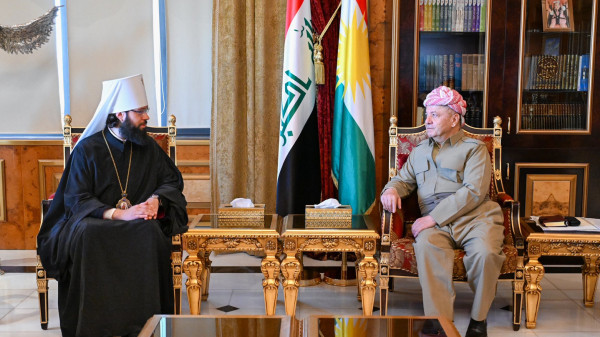
President Masoud Barzani (R) and Metropolitan Anthony (L), Chairman of the Department of External Russian Orthodox Church Relations. (Photo: Barzani HQ)
Ishtartv.com - kurdistan24.net
30 September, 2025
"The people of Kurdistan believe in harmony and coexistence from
the heart and with conviction," President Barzani stated, emphasizing that
this belief has evolved into "a strong culture which is rooted in history
and will remain for future generations."
In a powerful articulation of the Kurdistan Region’s core identity,
President Masoud Barzani on Tuesday declared that the deep-seated culture of
interfaith harmony and ethnic tolerance is not merely a government policy but a
conviction held "from the heart" by the people of Kurdistan. This
profound statement was delivered during a warm reception for a high-level
delegation from the Russian Orthodox Church, who in turn lauded the President's
personal role in fostering a climate of peace that they view as a beacon in a
turbulent region.
The meeting in Pirmam encapsulated a unified message from the Kurdistan
leadership, highlighting that the region's celebrated coexistence is a strong,
historically rooted culture destined to endure for generations to come.
On Tuesday, President Barzani welcomed the delegation, headed by
Metropolitan Anthony, the head of the external relations of the Russian
Orthodox Church, at his headquarters in Pirmam. The meeting, also attended by
Maxim Rubin, the Consul General of Russia in Erbil, provided a platform for the
visiting clergy to express their deep appreciation for what they had witnessed
in the region.
The delegation conveyed their happiness with their visit to Kurdistan
and specifically commended the pivotal role of President Barzani in deepening
the culture of coexistence. They praised the tangible peace and harmony that
exists among the diverse religious and ethnic components of Kurdistan, a
reality that stands in stark contrast to much of the surrounding Middle East.
The visiting clergy reiterated that they view the Kurdistan Region with
great importance, recognizing it as a part of the world that is a source of
humanity and one that holds a deep and genuine belief in coexistence. Looking
forward, the delegation expressed a strong desire for their relations with all
the religious centers within Kurdistan to continue and to be further
strengthened, signaling an intent to build lasting ties with the region’s faith
communities.
In his response, President Barzani warmly welcomed the guest delegation
and took the opportunity to emphasize the long-standing relations and
friendship that have historically connected the people of Kurdistan and the
people of Russia.
To illustrate the foundational nature of the region's social harmony,
President Barzani mentioned several historical examples of loyalty and
togetherness demonstrated by the various components of Kurdistan toward each
other, particularly during difficult and challenging times.
He explained that this was not a recent phenomenon or a political
construct. "The people of Kurdistan believe in harmony and coexistence
from the heart and with conviction," President Barzani stated, emphasizing
that this belief has evolved into "a strong culture which is rooted in
history and will remain for future generations."
This meeting with President Barzani followed an earlier engagement on
the same day in Erbil, where the Russian Orthodox delegation met with the
Prime Minister of the Kurdistan Regional Government (KRG), Masrour
Barzani. In that meeting, a consistent and unified message was presented.
The Prime Minister affirmed that "Kurdistan is the homeland of
different religions and faiths," and stressed that the KRG "always
works to deepen and strengthen the culture of coexistence and the principles of
peace and brotherhood among the various components."
The delegation's response to the Prime Minister mirrored their
sentiments expressed in Pirmam, praising the region as a place where it is a
"matter of fortune that in Kurdistan all religions and components live in
peace and tranquility and their rights are protected."
These diplomatic and religious discussions are a reflection of a
consistent and highly visible government strategy to not only protect but also
actively promote the region’s diversity. Just days earlier, Prime Minister
Barzani had celebrated this identity on an international stage during a
historic conference in Erbil commemorating the 1700th anniversary of the
Council of Nicaea.
Before a global audience of patriarchs and clergy, he declared that
peaceful coexistence is one of the "bright features and characteristics of
Kurdistan's society," promising that the region would remain a
"shining home of coexistence."
During that conference, the Prime Minister detailed the concrete
policies that underpin these declarations. He spoke of the KRG's unwavering
commitment to "protecting and defending religious, national, and cultural
diversity."
A prime example of this commitment is the government's robust support
for mother-tongue education. He highlighted the network of 50
KRG-supported Syriac schools, where the ancient language of the region's
Christian communities is kept alive. In these classrooms, students like
ninth-grader Sherpil Shimul find their learning experience transformed.
"When I study in Syriac, I understand and learn much better,"
he confirmed, giving a human voice to the success of a policy that has been
legally enshrined since the Kurdistan Parliament first passed the right to
mother-tongue education in 1993. This comprehensive support, which includes
providing textbooks, infrastructure, and qualified teachers, demonstrates a
holistic approach to cultural preservation.
This deep-rooted belief in coexistence, as articulated by President
Barzani, is a principle forged in a shared history of struggle and a collective
vision for the future. As Prime Minister Barzani stated at the Nicaea
conference, "Just as the components of Kurdistan have together faced
oppression, tyranny, and occupation, today we are also together for the sake of
building, reconstructing, developing, and advancing our homeland."
The appreciative words of the Russian Orthodox Church delegation this
week serve as a powerful international testament to the success of this shared
project, affirming that the harmony found in Kurdistan is indeed a heartfelt
conviction, a strong culture with deep historical roots, and a legacy to be
preserved for the future.
|